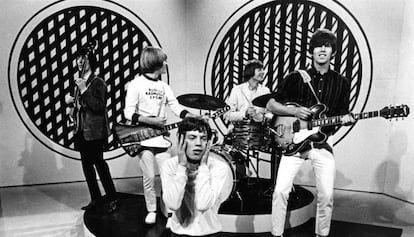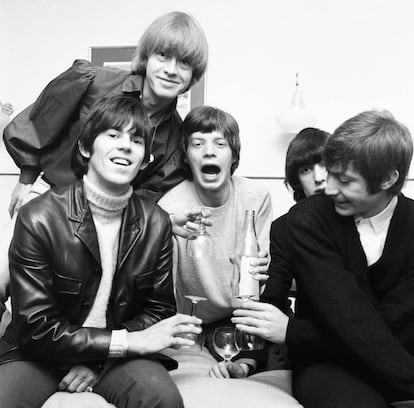When Mick Jagger became an adult
In 1966, The Rolling Stones played pop and their frontman was getting ready to act as a manager

A heads up: in the coming weeks, we will be seeing a lot of media hype over Mick Jagger’s 80th birthday. However, his real great transformation took place when he was 22, between 1965 and 1966. Sure, there would be more triumphant (and also more awful) years, but that was without a doubt the real annus mirabilis.
That was when The Rolling Stones finished their transformation from blues apostles into a pop band, an imposition of their discoverer, Andrew Loog Oldham: they must forget about singing other people’s songs to concentrate on their own creations. The job fell to Mick Jagger and Keith Richards after they found that the quintet’s instrumental genius, Brian Jones, had no songwriting skills.
(I Can’t Get No) Satisfaction, released June 5, 1965, is a slice of Memphis soul, as confirmed by Otis Redding’s searing recreation. Other resounding generational messages would follow, such as Get Off of My Cloud (September 25) and 19th Nervous Breakdown (February 4, 1966). It is true that the pop orientation of the band is more evident in the album Aftermath. A glorious recording, although diminished in reputation by two competing editions, with different covers and content.
A little secret: as kings of rock, the Stones tend to ignore their pop period to avoid drawing parallels with the envied, loathed Beatles. Aside from audacities like the 12 lascivious minutes of Goin’ Home, a pop sound prevails, with sticky melodies, handclaps and sparkling arrangements (Brian Jones’ marimba!). But don’t confuse pop with innocence: there are some amber jewels like Lady Jane, albeit overshadowed by sour messages (Stupid Girl, Under My Thumb, Out of Time) for the girls who displeased Jagger, a line somewhat legitimized by Like a Rolling Stone and other Dylanesque diatribes.
The 22-year-old Jagger also began to quietly take on managerial roles. Their official manager, Loog Oldham, sets the big picture, but lacks patience for the daily affairs (in fact, he takes off when the boys fall prey to police and judges). The helmsman of the ship – officially business manager – is Allen Klein, an American businessman who was an expert in squeezing record companies.

Jagger sticks with Klein to learn business survival tactics – and to keep him on a short leash. Mick is characterized by caution: he was the last to commit to the group, rejecting a scholarship to the London School of Economics (keeping the option of returning open, in case the music thing didn’t work out). Dismayed, he discovers that Klein used the Stones as a stepping stone to get closer to the true object of his desire, The Beatles. In time, he would also learn that, with the excuse of avoiding taxes, Klein kept all of the Stones’ recordings for Decca, and the rights to the Jagger-Richards songbook, until 1971.
A robbery without guns. Around 1968, Mick began to distance himself from Klein. Discreetly, he hires a banker, Prince Rupert Loewenstein, as a financial adviser. Not a very countercultural measure, but Jagger would personally fight for every one of his future record deals and tours. He may not look the type, but he is one of the great businessmen of rock.
Sign up for our weekly newsletter to get more English-language news coverage from EL PAÍS USA Edition
Tu suscripción se está usando en otro dispositivo
¿Quieres añadir otro usuario a tu suscripción?
Si continúas leyendo en este dispositivo, no se podrá leer en el otro.
FlechaTu suscripción se está usando en otro dispositivo y solo puedes acceder a EL PAÍS desde un dispositivo a la vez.
Si quieres compartir tu cuenta, cambia tu suscripción a la modalidad Premium, así podrás añadir otro usuario. Cada uno accederá con su propia cuenta de email, lo que os permitirá personalizar vuestra experiencia en EL PAÍS.
¿Tienes una suscripción de empresa? Accede aquí para contratar más cuentas.
En el caso de no saber quién está usando tu cuenta, te recomendamos cambiar tu contraseña aquí.
Si decides continuar compartiendo tu cuenta, este mensaje se mostrará en tu dispositivo y en el de la otra persona que está usando tu cuenta de forma indefinida, afectando a tu experiencia de lectura. Puedes consultar aquí los términos y condiciones de la suscripción digital.









































